- Home
- Nick Carter
Run, Spy, Run Page 6
Run, Spy, Run Read online
Page 6
PABLO VALDEZ. Cabinet Secretary, Minirio. Died September 3, 1963. Idlewild Airport, New York City, N.Y. Explosion on field killed eleven. Cause undetermined. Minirio increasingly subjected to Communist Chinese infiltration in recent months. Government now in state of chaos. Successor to Valdez not yet named.
The bulk of the file contained dossiers and reports from CAB, eyewitnesses, foreign authorities and airline officials; reports from the insurance companies connected with the wrecks, giving details of the various claims made by relatives; and the complete biographies of the first three diplomats involved. There were one or two gaps in the story of Valdez, but that was to be expected under the circumstances. No doubt more information would soon be available.
The one glaring, inescapable fact was that four men had died in airplane tragedies — four men who had held positions of power that the Red Chinese might be exceedingly happy to see vacated. Each man had stood in the way of some kind of Red Chinese power grab.
Surely not coincidence but master plan.
British officialdom, as a result of Hawk's personal call, had conceded that their conviction of pilot error in the case of the World Airways crash had been bolstered by the bottle-littered condition of the pilot's apartment, discovered after an anonymous tip; that the pilot's fiancée, Miss Rita Jameson, had repeatedly insisted that pilot Anderson was moderate in habit, had spent the early part of the evening with her and retired chastely for the night; that they had discounted her story, believing it to be the natural loyalty of a woman in love; that Miss Jameson had persisted in attempts to re-open the investigation; that she had received a politely worded official letter asking her discreetly to refrain from further enquiry, as her actions were an embarrassment and a hindrance to the investigating authorities, who had indeed not closed the case; and that, after waiting for some time to be further questioned or informed, Miss Jameson had discussed this letter with the authorities and all parties concerned had then realized that the communication was a forgery, designed, apparently, to forestall further interference. However, new evidence had come to light as a result of the continued investigation, and authorities agreed that it would be impolitic to encourage Miss Jameson's interest. The new facts being so appalling in their implications and the spuriousness of the letter suggesting something so sinister, it was felt that every effort should be made to pursue the inquiry in absolute secrecy, and that Miss Jameson should be advised to leave matters in the hands of the experts. She was also to be left with the impression that, the letter notwithstanding, they had as yet had no reason to ascribe the crash to any cause other than that already suggested.
In other words, Rita had been given the brush-off and forced to turn elsewhere for help.
The individual accused of planting a bomb on board the Afro-American Airlines plane via his father's suitcase had insisted that his father had himself suggested that heavy insurance be taken out, and that he, the son, had had no access to his father's suitcase for days before the crash, had not even been aware of the flying schedule. All those questioned in connection with insurance claims had similar stories. In fact, the authorities had all but given up the possibility of murder-for-insurance, but had allowed the public to go on believing in it since no other official theories could be made available.
Into the AXE files had come the story of each of the disasters as they had occurred. To Hawk's inquiring mind they had suggested a pattern. Consultation with other federal intelligence agencies had determined that AXE, the trouble-shooting arm of the cooperating services, would spearhead an investigation based on the possibility of international sabotage.
As to local events, a brief report revealed no conclusive link between the explosions and the attacks on Carter and Rita Jameson, but strongly supported Nick's own belief that each incident formed part of the same picture. The cablegram certainly provided a tie between Rita, Nick, and Flight 16, if not conclusively between that flight and the three previous disasters. As for A. Brown of 432A East 86th Street, he was apparently an infrequent user of a sparsely furnished walk-up apartment at that address, checking in daily for mail and messages but seldom sleeping there. Agents had staked out the place but were doubtful that their quarry would show. A description had, however, been obtained from the landlady and fingerprints had been lifted from various surfaces in apartment 4G.
Investigation of all facets of the situation was still under way. Further information was expected — Nick read on to the end.
So far, what they had was four dubious plane disasters and four dead diplomats. But Senor Valdez and his steel hand just didn't quite fit into the pseudo-accidental pattern of insurance schemes and pilot errors, of greedy relatives and lethal suitcases and inexplicable baggage tags. Senor Valdez had blown himself up, not by choice and almost certainly with his steel hand. How had that been accomplished, and by whom? Where did such a bizarre circumstance fit into the pattern presented by the first three catastrophes?
Now, once again, Nick went through the wallet, address book and personal documents of Peter Cane. Age. Height. Weight. Birthplace. Parents. Siblings. Education. School record. Friends. Sports. Other interests. Travels. Credit cards. Bank plate. Social Security number. Health Insurance. Club memberships. And so on, and so on, over and over again, until the information was printed on his brain.
A faint rustling noise came from the hallway. He snapped erect in the chair, all senses alert. A corner of something white was edging under the door. Carter rose soundlessly, reached for Wilhelmina, and glided over to the wall near the door frame. As he flattened himself against the wall, a white strip edged into the room.
The faintest of footfalls receded down the hall. He waited for a minute or two after the sound had faded, and then toed the letter toward him without putting his body in range of the door.
The envelope was inscribed with his new name.
It contained an airline ticket for Flight 601 from New York to London, leaving Idlewild Airport very early on the following morning. The ticket was made out in the name of Peter Cane. There was no need to wonder about the sender of the envelope: The a-n-e in "Cane" had been written in such a manner by whoever had sent the ticket that it looked like a-x-e.
Hawk was obviously ready to move.
Nick sniffed the envelope. His nostrils flared with the soft, subtle scent of a rare perfume, something exotic that he couldn't quite place. But it certainly wasn't aftershave lotion.
The party who had delivered Hawk's envelope was a woman.
The Burning Building
Everything was in order.
Dossiers read, information memorized. Peter Cane would fly out of New York on Flight 601 from Idlewild in the morning, doubtless receiving further instructions about his mission before the plane left the field. Nick knew Hawk and his methods.
But a woman! Who? Not Meg Hathaway from the Ops office. True, she always smelled delectable, but Coty was more in her line.
Nick filed the question away for future reference. Security, at the moment, was the main consideration. It seemed highly unlikely that any unauthorized person could know where he was, but the unknown enemy was resourceful.
The door was locked and Nick's coat hung over the knob to blank out the keyhole to prying eyes. He hooked a heavy chair under the same knob to make forced entrance difficult and furtive entry virtually impossible. The windows were as secure as height, and Nick, could make them. He surrounded his bed with newspapers, making it impossible for an intruder to approach him silently.
You had to keep on your toes if you wanted to stay alive, and you had to sleep while you could because there was no knowing what the assignment would bring.
Nick showered and prepared for bed. He mentally reviewed the facts in the bulky dossier willed to him by Hawk. In the morning he would destroy everything that did not relate directly to Peter Cane. Copies of all the data would already be on file with all the appropriate departments.
Nick yielded to sleep. His quiet, even breathing was the only sound
in the room.
Outside his door, the hotel corridor was silent and deserted.
But not for long.
Smoke.
The first indication of it was a pungent stab at Nick's nostrils. He came awake quickly, eyes straining in the darkness. An instant passed while he assembled his five senses before giving due credit to the phantom sixth that always seemed to alert him in time of danger. But there was no mistake. His nostrils were curling reflexively, pulling away from the acrid odor of stifling smoke. Yet the hotel was as peaceful as sleep.
Nick reached for the automatic pencil lying on the bedside table. It was also a flashlight with a beam that traveled a full thirty feet on high-powered batteries. Nick flicked it on, aiming it at the door.
The stab of light picked up a coiled snake of black smoke roping across the floor, from the narrow space beneath the door. But there was no sign of flame, no lick of orange light. He held the beam a second longer before easing himself to a crouch. Then he hurdled the newspapers with a broad jump and landed like a cat on the balls of his feet. The smoke began to gather alarmingly in the room.
Nick knew this game. Knew it too well to lose it. When you couldn't enter the bear's lair, you tried to smoke the bear out. The trick of the game this time was the imitation of a hotel fire. Didn't terrified guests, waking from a deep sleep, obey their first instincts and rush for the door, throwing it open both to see what was going on and obtain some blessed fresh air?
So there was only one thing to do.
It was a matter of flying seconds to dress hurriedly with only the propped pencil light to guide him. He kept his back to the billowing smoke as long as he could and held his breath while he gathered up the files and papers to thrust them into his briefcase.
He could have hollered "Help! Fire!," thrown a chair through the window, or phoned downstairs for help. But his instinct told him that his wire was probably cut. And he had just as much reason to maintain secrecy as did whoever was in the hall. Up to a point, Nick had to play the game their way and exit via the door. He padded back to the bathroom and moistened his handkerchief.
With silent speed, he pulled the chair away from the door, and whipped on his coat. The briefcase he put next to the door where he could reach it easily when he was ready to break out. Then he placed the handkerchief over his nostrils and tied it behind his head. He released the latch-lock with an audible click, pressed his ear to the door, and waited for any tell-tale sound.
He heard a door creak. Shoe leather made a little complaining sound as somebody moved. Nick stepped back and flung the door open, away from him, flattening himself against the wall.
Light from the corridor spilled in, revealing a length of rubber hose curling across the hall floor. There was no time to see anything else.
Three quick, muffled splats of sound and tongues of gun-propelled flame licked into the room. Carter managed a credible scream of choked surprise and hurled the chair over backwards. At the falling sound, two men loomed in the doorway, dark and indistinguishable, guns jutting, their long barrels made ungainly by bridged contraptions that were silencers.
The two men fired again, a salvo of pinging shots that picked up the chair and flung it around in the room. There was a brief, hesitant lull.
Nick detached himself from the wall in a lightning-swift move and kicked his hard-toed shoe upward in a savage arc. It might have been a perfect place kick in a football game. As it was, the deadly weapon, employed with the finest French accent of Le Savate, caught the nearest man dead-center on the point of the chin. A dark fedora sailed from the crown of his skull as his head flew back. Nick moved swiftly around him in a flying crouch. The second man gave a croak of surprise and swung his gun toward Nick. He was too late. The karate blow, with the elbow pointed upward and the palm stiffened in a flying wedge of destruction, chopped viciously and landed with the impact of a sledgehammer. The man screamed his pain and collapsed on the threshold, his nose spouting great gouts of blood.
Time was running out. The hotel was showing signs of coming awake. A door slammed down the hallway. Voices rose in a querying clamor.
Talking to policemen was not one of the things Carter intended to do. He scooped up his briefcase, stepped swiftly over the moaning human wrecks in the doorway, and streaked down the hallway toward the stairs yelling, 'Tire!"
The smoke created a useful diversion. Behind him, the quavering voice of a guest took up his cry of "Fire!"
An even greater diversion than the billowing clouds of smoke would be the open door of the room almost opposite his, with the small metal tank that poured black smoke through the snaky length of rubber hose. That was going to take some explaining when those buzzards came to.
Nick thought of this with satisfaction as he checked his downward course on the second floor and headed for the fire escape. If there was anyone waiting for him outside, they weren't going to pick him off at the front door.
He reached ground and turned on to the crosstown street.
A red Jaguar was slowly turning the corner into Central Park West. Nick stared. The driver was wearing the black picture hat he had seen at Yankee Stadium.
Nick stepped back into the shadows. Shouts came from upstairs, but he knew by their muffled quality that they were directed to something within.
Moments passed.
The Jaguar turned smoothly around the far corner and headed toward him. He stepped from the shadows, his free hand ready to use Wilhelmina.
"That's far enough," he said, and put his hand on the slowly moving car. It stopped.
The woman looked at him calmly, only her raised eyebrows indicating any surprise.
"Get in," she said. "I was waiting for you."
"I thought you might be," Nick said easily. "I was waiting for you. Move over. Come on, move. That's better."
She moved reluctantly. Nick got in behind the wheel.
"I always feel easier when I'm driving," said Nick, beating a stop light. "I find conversation so much more pleasant. Did you enjoy the game?"
"Five to nothing, Yankees," she said matter-of-factiy. "A bore. Now tell me where you think you're going."
Nick turned north, then gave his attention to her. The limpid, almost Asian eyes and the wide red mouth were just as he remembered them. But the enigmatic expression had gone and she looked — what? — Not at all afraid Piqued, somehow.
"It doesn't matter where we're going, as long as we can talk. Let's start with this: Why were you waiting for me?"
She flashed an angry look at him. "Because I saw those two hoods go in and I thought..."
His voice lashed at her. "You saw them or you led them?"
"How could I lead them?" The marvelous eyes flashed with anger. "I was there all evening!"
"Oh, you were," he murmured. "Why would that be?"
"Why do you think? I had orders to keep an eye on you."
He hooted. "Hah! And to what purpose, may I ask? To make sure I was neck deep in trouble?"
The rear-view mirror showed nothing out of the way. He made a sharp left turn, just in case, and made for West End Avenue.
"Who gave the orders?" he asked quietly, studying her profile out of the corner of his eye. It was worth studying. He liked it very much. But lady spies were no novelty to him.
"Mr. Cane." The voice was low and dangerous. So she knew his sometime name. "I know a great deal about you. You were sitting with a man in Section 33 this afternoon. A man I know very well. He doesn't really approve of female agents but my record is too good for even him to ignore. You follow me, Mr. Cane?"
He swung south. "Not altogether, and I hope no one else is. Do you know," he added conversationally, "that there's no way in the world anyone could have found me tonight, except to have followed you?"
"That's not true. That can't be true. I know how to be careful."
He laughed. "In a red Jaguar?" She made a small, muffled sound. "By the way," he said, glancing at the dashboard, "we'll be driving a long way tonight and we may
need gas. Since this is your party, do you have five dollars?"
From her purse she took a five-dollar bill and thrust it at him. He took it and slowed down as he turned it over. The dashboard light showed the familiar picture of the Lincoln Memorial. The shading of the bushes to the left of the pillars spelled out the ragged letters COMSEC. Combined Security.
He gave it back to her.
"Now about that man. Who was he?"
"He's the one I was trying to take you to see," she snapped savagely.
"And what about me?"
"N-3 of AXE. I brought you an envelope this evening. With an airline ticket in it. Now suppose you let me drive."
"Just tell me where we're going and I'll drive. We've been theatrical enough already, don't you think?"
It was obviously an effort for her to give him the address. But she gave it.
"Tch. Should have told me that before. Look at all the time we've wasted."
He turned uptown.
She spoke bitterly. For someone who's supposed to be a gentleman, you're a smart-aleck, aren't you?"
"Not always smart enough," he answered seriously. "And neither are you. Didn't it occur to you that they just needed someone like you to lead them to me? And didn't you think that they might have left someone waiting outside, watching you?"
She was silent.
"You didn't Well, you should have."
The Jaguar clawed its way through a jam of cars on West 79th and turned easily on Riverside Drive. Up ahead, Nick could see the brilliantly lit outline of the George Washington Bridge.
"You're right," she said at last. "Maybe I'm the smart-aleck."
He smiled, and put his hand briefly on her shoulders.
"I haven't been doing so well lately, myself. What can I call you?"
She made a face. "Dope. Idiot. Incompetent..."
"No, no. I mean your name."
The lovely lips curved into a smile. "At the moment, Julia Baron."
"Nice. Very nice. Julie. I trust you'll call me Pete. Unless, of course, our mutual friend is less mutual than you claim."

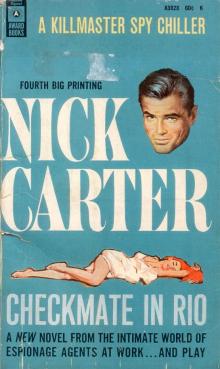 Checkmate in Rio
Checkmate in Rio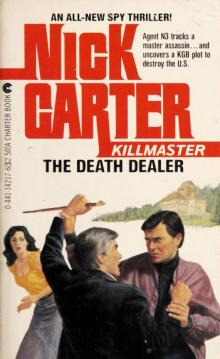 The Death Dealer
The Death Dealer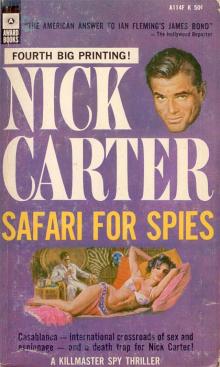 Safari for Spies
Safari for Spies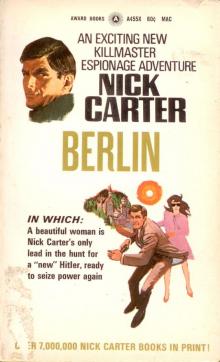 Berlin
Berlin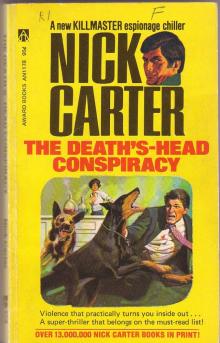 The Death’s Head Conspiracy
The Death’s Head Conspiracy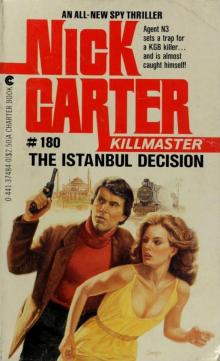 The Istanbul Decision
The Istanbul Decision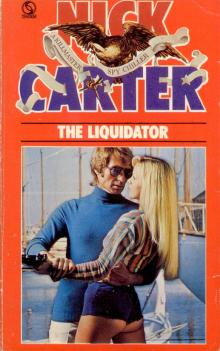 The Liquidator
The Liquidator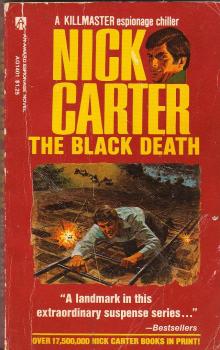 The Black Death
The Black Death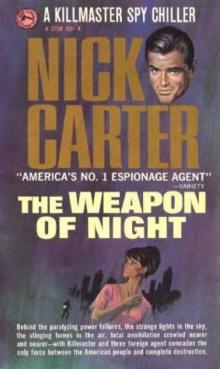 The Weapon of Night
The Weapon of Night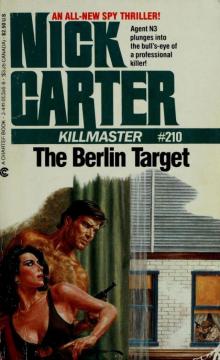 The Berlin Target
The Berlin Target Temple of Fear
Temple of Fear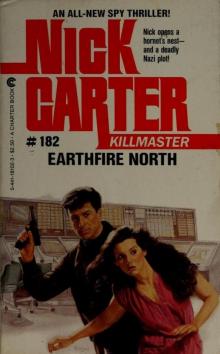 Earthfire North
Earthfire North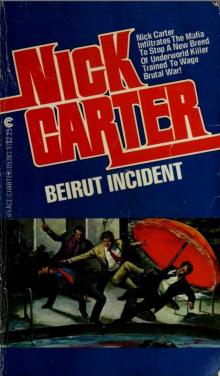 Beirut Incident
Beirut Incident White Death
White Death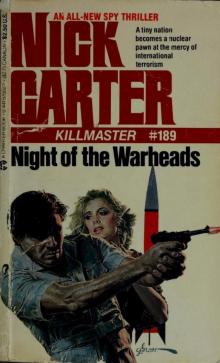 Night of the Warheads
Night of the Warheads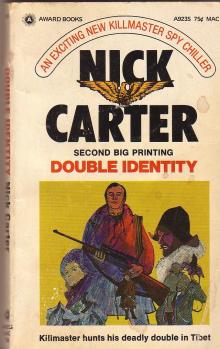 Double Identity
Double Identity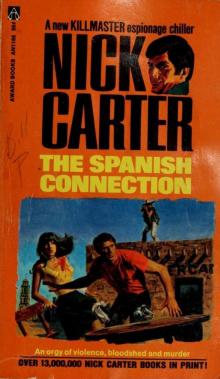 The Spanish Connection
The Spanish Connection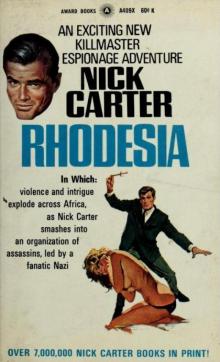 Rhodesia
Rhodesia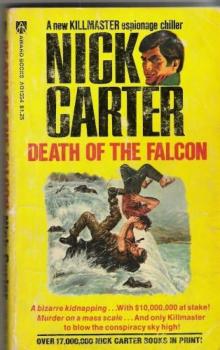 Death of the Falcon
Death of the Falcon The Executioners
The Executioners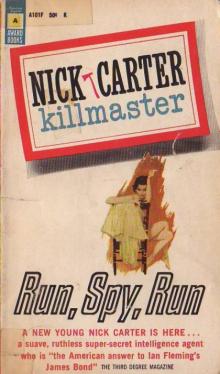 Run, Spy, Run
Run, Spy, Run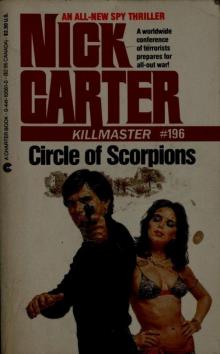 Circle of Scorpions
Circle of Scorpions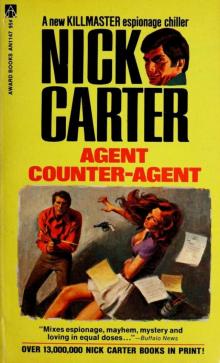 Agent Counter-Agent
Agent Counter-Agent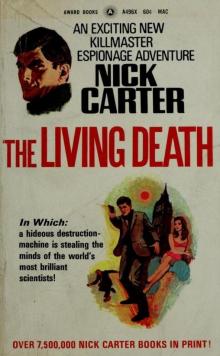 The Living Death
The Living Death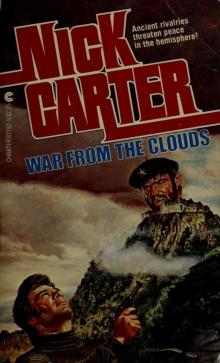 War From The Clouds
War From The Clouds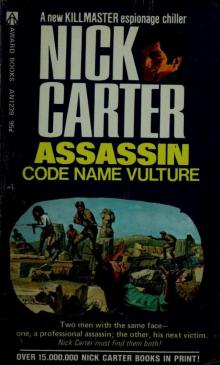 Assassin: Code Name Vulture
Assassin: Code Name Vulture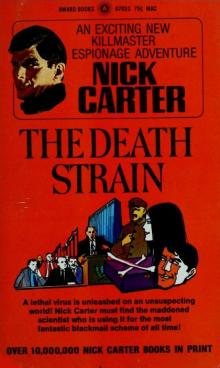 The Death Strain
The Death Strain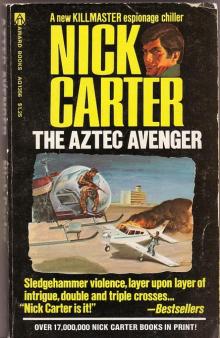 The Aztec Avenger
The Aztec Avenger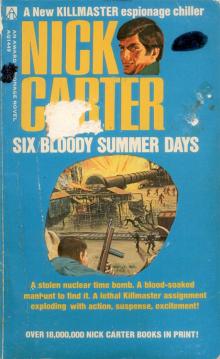 Six Bloody Summer Days
Six Bloody Summer Days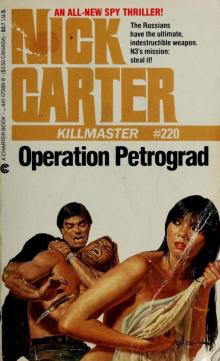 Operation Petrograd
Operation Petrograd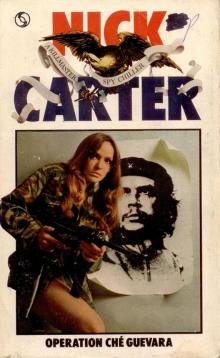 Operation Che Guevara
Operation Che Guevara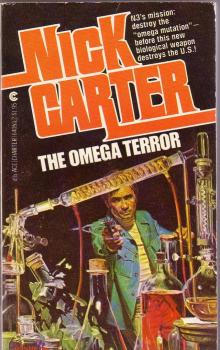 The Omega Terror
The Omega Terror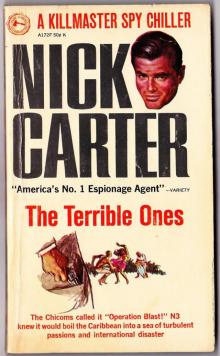 The Terrible Ones
The Terrible Ones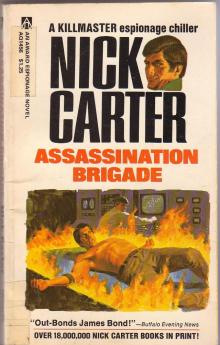 Assassination Brigade
Assassination Brigade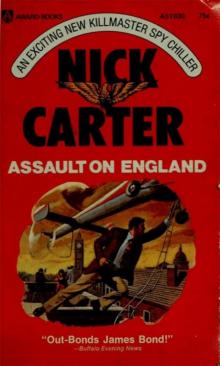 Assault on England
Assault on England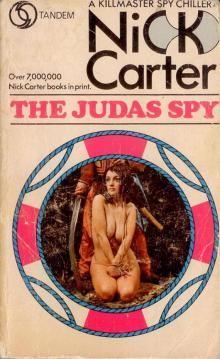 The Judas Spy
The Judas Spy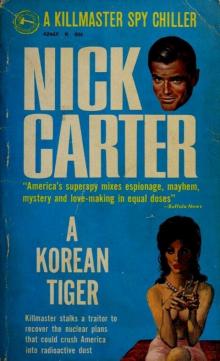 A Korean Tiger
A Korean Tiger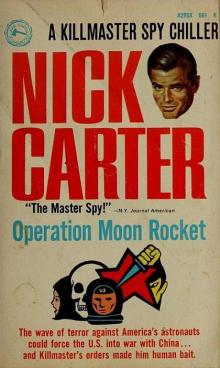 Operation Moon Rocket
Operation Moon Rocket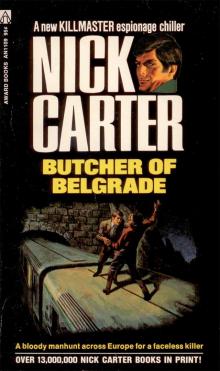 Butcher of Belgrade
Butcher of Belgrade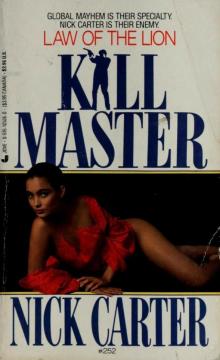 Law of the Lion
Law of the Lion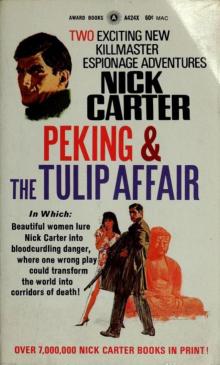 Peking & The Tulip Affair
Peking & The Tulip Affair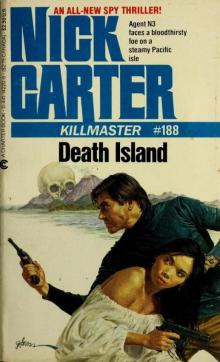 Death Island
Death Island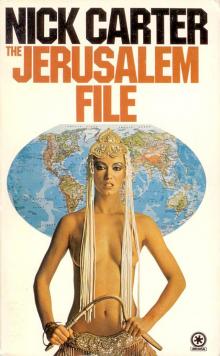 The Jerusalem File
The Jerusalem File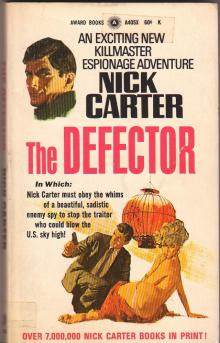 The Defector
The Defector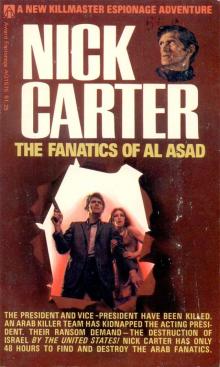 The Fanatics of Al Asad
The Fanatics of Al Asad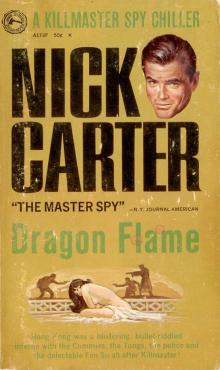 Dragon Flame
Dragon Flame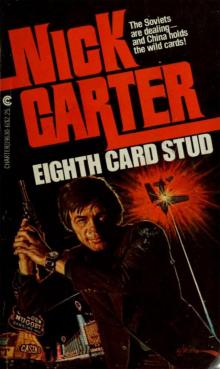 Eighth Card Stud
Eighth Card Stud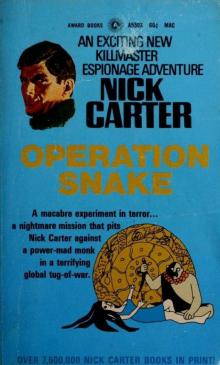 Operation Snake
Operation Snake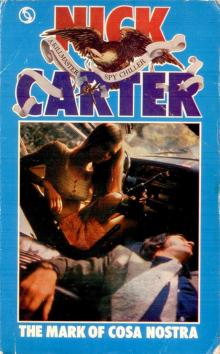 The Mark of Cosa Nostra
The Mark of Cosa Nostra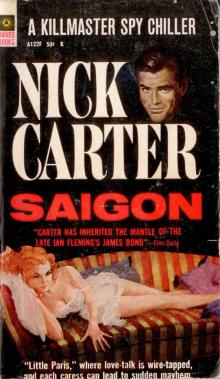 Saigon
Saigon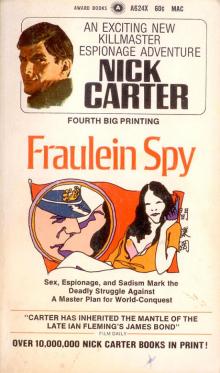 Fraulein Spy
Fraulein Spy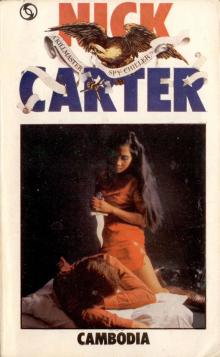 Cambodia
Cambodia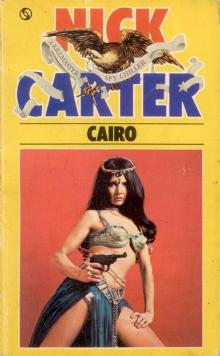 Cairo
Cairo